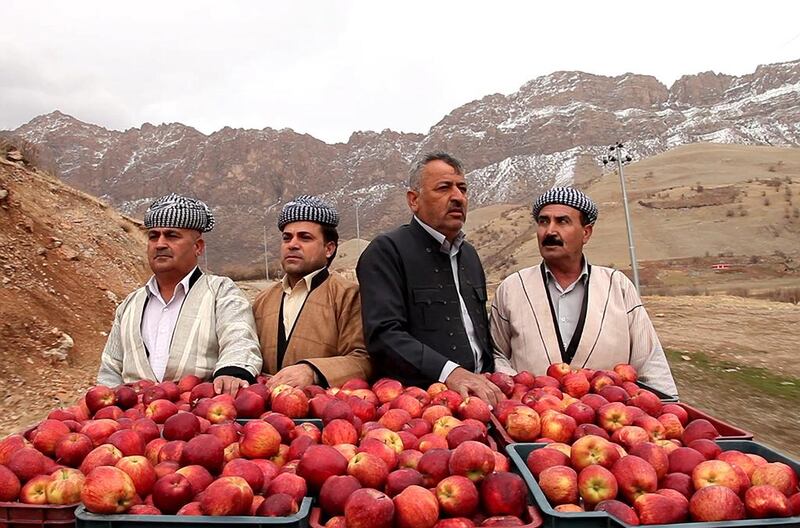This year’s edition of the Tromsø International Film Festival, which runs from today to January 19, features a section on films made about Kurds between 1982 and the present day. In addition to the nine films chosen for Signals: Kurdistan, 1001 Apples by Taha Karimi will be shown in competition.
Situated in the Arctic Circle in Norway, Tromsø hosts the northernmost festival on the international film festival calendar. The event has seven venues, including one open-air cinema in the snow. In addition to the movies, on lucky days you might catch a glimpse of the Northern Lights. In terms of audience size, it’s the biggest film festival in Norway, boasting an excellent programme of celebrated films on the festival circuit, as well as Scandinavian premieres and talks.
The festival’s director Martha Otte explains the rationale behind the decision to focus on Kurdistan at this year’s festival: “In 2014, Norway celebrates the bicentenary of the Norwegian constitution and Norway’s independence. This is an opportunity to reflect on the values of freedom, independence and democracy. The goal of our sidebar is to bring attention to the situation of the Kurdish people – the largest ethnic group in the world without a national state.”
The Kurdish programme was developed through the festival’s relationship with Hisham Zaman, the Kurdish-Norwegian film director. His film Winterland opened the Tromsø film festival in 2007, and in 2013 the festival opened with the world premiere of Before Snowfall. A road movie that travels through Turkey, Greece, Germany and Norway, it won the prize for Best Film from the Arab World in the New Horizons category at last year’s Abu Dhabi Film Festival.
Otte explains that much can be gleaned from watching cinema: “The value of film as a vehicle for learning about other cultures is indisputable and invaluable. At one level, our selection is simply a showcase of films by and about Kurdish people from the last 30 years. I don’t think the selection opens for assumptions of a cinematic trend, but I would say that these films definitely can serve as an inspiration for filmmakers who aspire to transform the stories of their own cultures into works of art with universal appeal.”
The Kurdish selection features the 1982 Palme d’Or winner Yol, Yilmaz Güney’s film about five Turkish prisoners that takes place after the 1980 coup. Güney, who died in 1984, directed the film from his prison cell, phoning his co-director Serif Gören, who then implemented his instructions on set. The film was banned in Turkey until 1999.
The other eight films screening are Bahman Ghobadi’s A Time for Drunken Horses (2000), Ebrahim Saeedi’s All My Mothers (2009), Shawkat Amin Korki’s Crossing the Dust (2006), Yesim Ustaoglu’s Journey to the Sun (1999), Hiner Saleem’s My Sweet Pepper Land (2013), Mark Cousins’ The First Movie (2009), Salem Salavati’s The Last Winter (2013) and Hüseyin Tabak’s Your Beauty Is Worth Nothing (2012).
“Kurdish cinema is incredibly diverse,” says Otte. “Kurdish filmmakers live and work in many countries under very different conditions. If I have to generalise, I would say that many Kurdish filmmakers have an impressive ability to process their stories and make them accessible and interesting for outsiders. This is not a given. There are other groups that have dramatic stories to tell, but their filmmakers don’t seem to have the necessary distance to their material to help their stories travel. Many fall into the trap of reproducing the suffering, rather than offering a perspective on the situation.”
There are two heart-rending stories attached to competition entry 1001 Apples. First there is the story on screen, a documentary about five men who decide to buy 1,001 apples and give them to those who lost family members in the 1988 Al-Anfal Campaign, which saw Kurds in Iraq killed and buried in mass graves. Secondly, in May 2013, the film’s 37-year-old film director died in a car accident in Tehran.
Appearing in the basketball sidebar is Salaam Dunk, a documentary about the girls basketball team at the American University of Iraq in Sulaimani. In their first season they lost every single game.
Two films set in India are also worth keeping an eye out for: Kim Longinotto’s Salma, about a Muslim poet who campaigns for the right of Muslim girls to partake in society, and Siddharth, Richie Mehta’s child-abduction drama.
• For more information, visit www.tiff.no
artslife@thenational.ae
Follow us @LifeNationalUAE
Follow us on Facebook for discussions, entertainment, reviews, wellness and news.






